Module3TheViolenceofNature语言点知识梳理
Module 3 The Violence of NatureM3P3grammer解读

•He often says, “China is great.”
•He often says (that) China is great. •“I don’t want to play football.” he said.
•He said (that) he didn’t want to play football.
present simple becomes past simple
Grammar 2 -2. Observation (4m) What are the tense changes in indirect speech?
He said, “Eleven thousand people live here and six thousand left last week.” He said that eleven thousand people lived there and six thousand had left a week before before.
外研版高中英语第三册
Module 3 The Violence of Nature
Period 2
Module 3 The Violence of Nature Grammar 1 Grammar 2
Grammar 1-1. Observation (3m) what can you see from the following sentences?.
•1. saw, had disappeared •2. returned, found, had been buried •3. arrived, had taken •4. left, had finished •5. tried, passed
外研社版高一英语Module3TheViolenceofNature知识精讲

外研社高一英语Module 3 The Violence of Nature精品学案【本讲教育信息】一. 教学内容:Module 3 The Violence of Nature二. 重难点讲解:1. disaster名词n. 灾难;祸患very bad happeningFires, floods and earthquakes are disasters.火灾、水灾和地震都是灾难。
翻译:We overcame the natural disaster and got in a bumper harvest.a national disastera traffic disastera disaster to sb.某人的灾难2. flood(1)名词n. 洪水a large flow of waterMany houses were destroyed by the flood.许多房屋被洪水冲毁了。
翻译:那场大雨后闹了洪水,我们的家都淹了。
(2)名词n. 大批,大量a lot of somethingI had a flood of letters on my birthday.我生日那天收到一大堆信。
(3)动词v. 淹没,泛滥to fill or cover with waterThe river has flooded a number of villages.洪水淹没了一些村庄。
翻译:春雨期间河水泛滥。
(4)动词v. 充满fill,cover, or overcome, as if with a floodLetters of congratulation flooded in.大批祝贺信像潮水般地涌来。
The room was flooded with moonlight.这房间充满了月光。
翻译:热泪盈眶3. experience(1)不可数名词n.[U] 经验knowing about things because you have done or seen themHe has much experience as an engineer.作为工程师来说,他是富有经验的。
Module3TheviolenceofNature知识点.doc
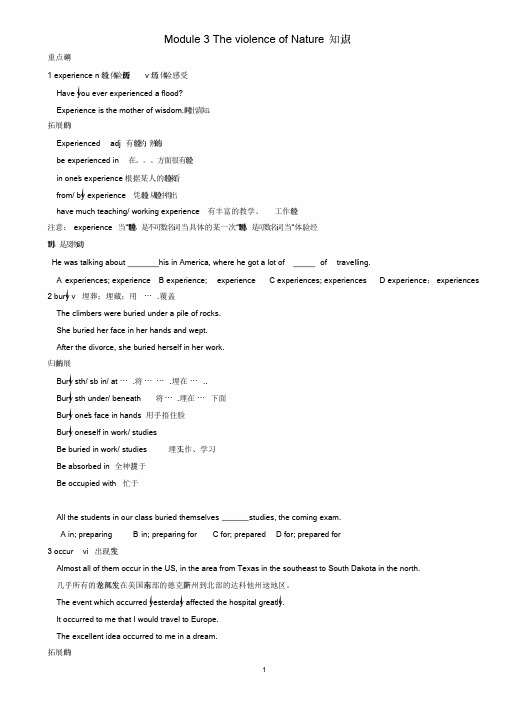
Module 3 The violence of Nature 知识点词重点单1 experience n经验;体验;经历;阅v经历,体验,感受Have you ever experienced a flood?Experience is the mother of wisdom.时间出真知。
纳拓展归Experienced adj 有经验的;熟练的be experienced in 在。
方面很有经验in one’s experience 根据某人的经验来看from/ by experience 凭经验;从经验中得出have much teaching/ working experience 有丰富的教学、工作经验”讲时,是可数名词历,经;当“体验注意:experience 当“经;当具体的某一次“经验”讲时,是不可数名词。
词历”讲时,是及物动He was talking about his in America, where he got a lot of of travelling.A experiences; experienceB experience; experienceC experiences; experiencesD experience;experiences2 bury v 埋葬;埋藏;用⋯.覆盖The climbers were buried under a pile of rocks.She buried her face in her hands and wept.After the divorce, she buried herself in her work.拓展归纳Bury sth/ sb in/ at ⋯.将⋯⋯.埋在⋯..Bury sth under/ beneath 将⋯.埋在⋯下面Bury one’s face in hands 用手捂住脸Bury oneself in work/ studiesBe buried in work/ studies 埋头工作、学习Be absorbed in 全神贯注于Be occupied with 忙于All the students in our class buried themselves studies, the coming exam.A in; preparingB in; preparing forC for; preparedD for; prepared for3 occur vi 出现;发生Almost all of them occur in the US, in the area from Texas in the southeast to South Dakota in the north.生在美国东南部的德克萨斯州到北部的达科他州这一地区。
英语.新高考总复习必修3 Module 3 The Violence of Nature

必修3
Module 3 The Violence of Nature
考纲单词分层 常用短语
重点句型 主题语篇填空
-2-
(主题语境:人与自然——灾难防范)
必背表达单词——写作信手拈来
1. flood n.
洪水
2. experience vt. 经历
考纲单词分层 常用短语
重点句型 主题语篇填空
-15-
The most 1. violent
(violence) tornadoes have winds of over
400 km per hour.2. They can take cars,trains and even houses to
other places,and also take the fur or feathers 3. off an animal.Almost all tornadoes occur in the US.On average,there’re 800
必修3
Module 3 The Violence of Nature
考纲单词分层 常用短语
重点句型 主题语篇填空
-4-
识记阅读单词——读文理解通畅
1.disaster n.
灾难
2.hurricane n.
飓风
3.lightning n.
闪电
4.thunderstorm n.
雷暴
5.tornado n.
7.a total of... 总数为……
必修3
Module 3 The Violence of Nature
考纲单词分层 常用短语
(完整版)外研版必修3Module3TheViolenceofNature

Module 3 The Violence of NatureⅠ.写作单词——会拼写1.cause vt.引起;导致2.bury vt.埋葬3.occur vi.发生4.ruin vt.毁坏5.damage n.& v. 损失;损害6.warn v. 警告→warning n.警告7.furnish v. 装备;配备→furniture n.家具8.experience vt.经历→experienced adj.有经验的9.violent adj.猛烈的;激烈的;强烈的→violence n.暴力10.thankful adj.感激的→thankfully adv.感激地;满怀感谢地11.sad adj.悲伤的→sadly adv.伤心地;不幸地→sadness n.悲伤12. luck n.运气,好运→ lucky adj.幸运的→luckily adv.幸运地;幸亏13.fortune n.运气→fortunate adj.幸运的→fortunately adv.幸运地;幸亏14.possibility n.可能;可能性→possible adj.可能的→(近义词)likely/probable15.strike vt.& n.(雷电、暴风雨等) 袭击→过去式struck→过去分词stricken/struck16.hope vt.&n. 希望→hopeful adj.满怀希望的;有希望的→hopefully adv.满怀希望地;有希望地17.terrify vt.使惊恐;使受惊吓→terrifying adj.吓人的;可怕的→terrified adj.恐惧的;受惊吓的Ⅱ.阅读单词——要识记18.disaster n.灾难19.flood n.洪水20.hurricane n.飓风21.lightning n.闪电22. column n.柱状物;柱状体23. current n.海流;潮流24. wave n.波浪25. erupt vi.(火山的)爆发;喷发26.previous adj.以前的27.earthquake n.地震28. worldwide adj.全世界的29.active adj.积极的;活跃的高频短语——会默写1.pick up 卷起;掀起;(偶然)学会2.put down 记下;放下;镇压3.take off 去掉;突然成功4.on average 平均起来5.end up 结果为……,以……结束6.set fire to 放火 (焚烧) ……7.catch fire 着火8.put out 扑灭 (火)9.take place 发生10.in all 总共;总计教材原句——会背诵句式仿写——能应用1.They can destroy houses,but leave the furniture inside exactly where it was.(leave+宾语+宾补) 1.把药放在孩子们够不到的地方。
Module3 The violence of Nature_知识点
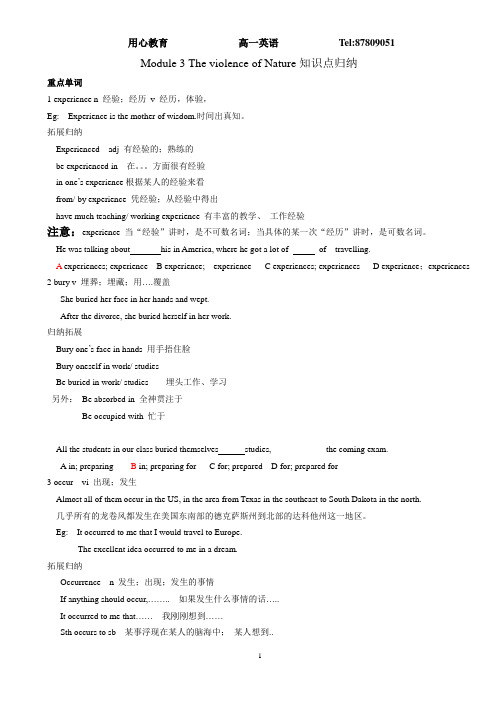
Module 3 The violence of Nature知识点归纳重点单词1 experience n 经验;经历v 经历,体验,Eg: Experience is the mother of wisdom.时间出真知。
拓展归纳Experienced adj 有经验的;熟练的be experienced in 在。
方面很有经验in one’s experience根据某人的经验来看from/ by experience 凭经验;从经验中得出have much teaching/ working experience 有丰富的教学、工作经验注意:experience 当“经验”讲时,是不可数名词;当具体的某一次“经历”讲时,是可数名词。
He was talking about his in America, where he got a lot of of travelling.A experiences; experienceB experience; experienceC experiences; experiencesD experience;experiences2 bury v 埋葬;埋藏;用….覆盖She buried her face in her hands and wept.After the divorce, she buried herself in her work.归纳拓展Bury one’s face in hands 用手捂住脸Bury oneself in work/ studiesBe buried in work/ studies 埋头工作、学习另外:Be absorbed in 全神贯注于Be occupied with 忙于All the students in our class buried themselves studies, ____________the coming exam.A in; preparingB in; preparing forC for; preparedD for; prepared for3 occur vi 出现;发生Almost all of them occur in the US, in the area from Texas in the southeast to South Dakota in the north.几乎所有的龙卷风都发生在美国东南部的德克萨斯州到北部的达科他州这一地区。
Module3 The Violence of Nature Reading

Book 3 Module 3 The Violence of NatureReadingI.背景知识:一、(Natural disaster/Natural hazard)“自然灾害”是人类依赖的自然界中所发生的异常现象,自然灾害对人类社会所造成的危害往往是触目惊心的。
它们之中既有地震、火山爆发、泥石流、海啸、台风、洪水等突发性灾害;也有地面沉降、土地沙漠化、干旱、海岸线变化等在较长时间中才能逐渐显现的渐变性灾害;还有臭氧层变化、水体污染、水土流失、酸雨等人类活动导致的环境灾害。
这些自然灾害和环境破坏之间又有着复杂的相互联系。
人类要从科学的意义上认识这些灾害的发生、发展以及尽可能减小它们所造成的危害,已是国际社会的一个共同主题。
中国自然灾害种类繁多。
地震、台风、暴雨、洪水、内涝、高温、雷电、大雾、灰霾、泥石流、山体滑坡、海啸、道路结冰、龙卷风、冰雹、暴风雪、崩塌、地面塌陷、沙尘暴等等,每年都要在全国和局部地区发生,造成大范围的损害或局部地区的毁灭性打击。
二、(Tornado, hurricane and typhoon)飓风和台风都是指风速达到33米/秒以上的热带气旋,只是因发生的地域不同,才有了不同名称。
出现在西北太平洋和我国南海的强烈热带气旋被称为“台风”;发生在大西洋、加勒比海和北太平洋东部的则称“飓风”。
飓风在一天之内就能释放出惊人的能量。
飓风与龙卷风也不能混淆。
后者的时间很短暂,属于瞬间爆发,最长也不超过数小时。
此外,龙卷风一般是伴随着飓风而产生。
龙卷风最大的特征在于它出现时,往往有一个或数个如同“大象鼻子”样的漏斗状云柱,同时伴随狂风暴雨、雷电或冰雹。
龙卷风经过水面时,能吸水上升形成水柱,然后同云相接,俗称“龙取水”。
经过陆地时,常会卷倒房屋,甚至把人吸卷到空中。
II.在课文中标出下列单词、短语和它们的含义。
1. Texas 得克萨斯州2. South Dakota美国南达科他州3. Missouri 密苏里州4. Illinois 伊利诺伊州5. Indiana 印第安纳州6. the Atlantic Ocean 大西洋7. the Caribbean Sea 加勒比海8. the Gulf of Mexico 墨西哥湾9. Maine 缅因州10. Galveston 加尔维斯顿11. Charles Coghlan 查尔斯.科格伦12. Irish 爱尔兰13. Prince Edward Island 爱德华王子岛课上学案Reading comprehension 阅读理解I. Read What is a Tornado? and try to decide if these sentences are True or False. If they are false, please correct them.(判断正误并改错,并从文中找到对应点)①A tornado is a rotating column of air from a thunderstorm to the ground. ( )②The most violent have winds of 4000 kilometres per hour. ( )③Tornadoes can pick up cars ,trains and even houses and put them down in the next street –or even in the next town. ( )④They can take the feathers off a chicken, but they could n’t destroy houses. ( )⑤On average, there are 800 tornadoes in the UK each year, causing 80 deaths and 1500 injuries. ( )⑥The worst tornado was in 1925 and it killed 2700 people. ( ) II. Read What is a hurricane? and try to answer the following questions .1)What is a hurricane and where do they occur?2) What happens at sea during a hurricane?3) When was the worst hurricane and how many people died in it?B3 Module 3 The Violence of NatureLearning Plan 1 The Gulf Stream &What is a Tornado?目标和要求: 1. 明确词汇的汉语意思、准确读出、并能默写出。
新课标外研社版高中英语必修三教材知识点详解(Module3 The Violence of Nature)
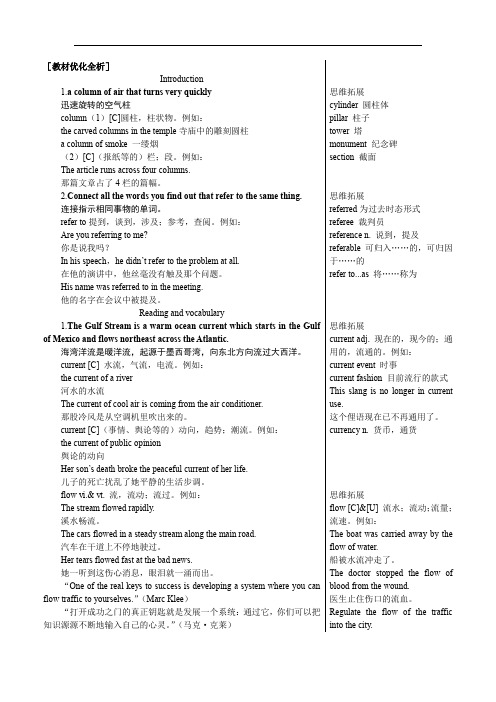
[教材优化全析]Introduction1.a column of air that turns very quickly迅速旋转的空气柱column(1)[C]圆柱,柱状物。
例如:the carved columns in the temple寺庙中的雕刻圆柱a column of smoke 一缕烟(2)[C](报纸等的)栏;段。
例如:The article runs across four columns.那篇文章占了4栏的篇幅。
2.Connect all the words you find out that refer to the same thing.连接指示相同事物的单词。
refer to提到,谈到,涉及;参考,查阅。
例如:Are you referring to me?你是说我吗?In his speech,he didn’t refer to the problem at all.在他的演讲中,他丝毫没有触及那个问题。
His name was referred to in the meeting.他的名字在会议中被提及。
Reading and vocabulary1.The Gulf Stream is a warm ocean current which starts in the Gulf of Mexico and flows northeast across the Atlantic.海湾洋流是暖洋流,起源于墨西哥湾,向东北方向流过大西洋。
current [C] 水流,气流,电流。
例如:the current of a river河水的水流The current of cool air is coming from the air conditioner.那股冷风是从空调机里吹出来的。
current [C](事情、舆论等的)动向,趋势;潮流。
例如:the current of public opinion舆论的动向Her son’s death broke the peaceful current of her life.儿子的死亡扰乱了她平静的生活步调。
Module 3 The Violence of nature知识点
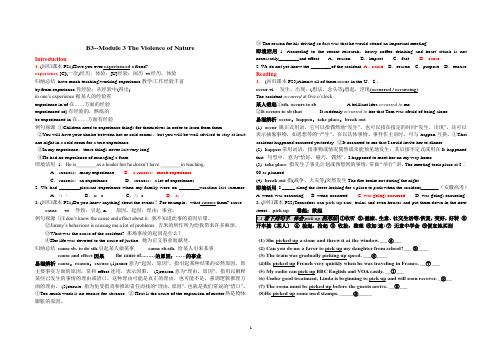
B3--Module 3 The Violence of NatureIntroduction1. (回归课本P21)Have you ever experienced a flood?experience [C](一次)经历,体验;[U]经验;阅历vt.经历,体验归纳总结have much teaching/working experience教学/工作经验丰富by/from experience凭经验;从经验中(得出)in one’s experience据某人的经验看experience in/of在……方面的经验experienced adj.有经验的,熟练的be experienced in在……方面有经验例句探源①Children need to experience things for themselves in order to learn from them.②You will have your choice between hot or cold rooms,but you will be well advised to stay at least one night in a cold room for a true experience.③In my experience,these things never last very long.④He had no experience of managing a farm.即境活用1.He is________as a leader but he doesn’t have ________in teaching.A.success;many experience B.a success;much experienceC.success;an experience D.success;a lot of experiences2. We had ________pleasant experience when my family were on ________vacation last summer.A./;/ B.a;a C./;a D.a;/2. (回归课本P21)Do you know anything about the events?For example,what causes them? causecause vt.导致;引起n.原因,起因;理由;事业;例句探源①I don’t know the cause and effect about it. 我不知道此事的前因后果。
英语全能讲义必修3Module3TheViolenceofNature

Module 3 The Violence of Nature Ⅰ. 多维记忆重点单词※核心单词速记1. disaster n. 灾难2. previous adj. 以前的; 早先的3. cause vt. 引起; 导致4. occur vi. 发生5. strike vt. &n. (雷电、暴风雨等)袭击6. ruin vt. 毁坏7. damage n. &v. 损失; 损害※联想单词串记8. experience vt. 经历n. 经历; 经验→experienced adj. 有经验的9. furniture n. 家具→furnish vt. 装备; 配备10. bury vt. 埋葬→burial n. 埋葬, 葬礼11. violent adj. 猛烈的; 激烈的; 强烈的→violence n. 暴力12. possibility n. 可能; 可能性→possible adj. 可能的13. terrifying adj. 吓人的; 可怕的→terrified adj. 受惊吓的; 恐惧的→terrify vt. 使恐惧; 使害怕14. fortunately adv. 幸运地; 幸亏→fortunate adj. 幸运的→fortune n. 运气; 财富15. warning n. 警告→warn v. 警告16. luckily adv. 幸运地; 幸亏→luck n. 运气; 幸运→lucky adj. 幸运的17. hope v. &n. 希望→hopeful adj. 有希望的→hopefully adv. 满怀希望地18. thankfully adv. 感激地; 满怀感谢地→thankful adj. 感激的用所给词的适当形式填空1. Buried(bury) in his book, he didn’t care about what happened around him.2. We must accept the possibility (possible) that we might be wrong.3. That plane crash occurred (occur) only minutes after takeoff.Ⅱ. 语境记忆重点短语1. refer to指的是; 谈到; 提到; 涉及2. pick up卷起; 掀起; 拾起; 搭载3. put down记下; 放下; 镇压4. take off去掉; 脱掉; 起飞; 兴旺5. on average平均起来6. end up结果为……; 以……结束7. be buried in被埋葬在……; 忙于做……8. from side to side左右摇摆9. set fire to放火(焚烧)……10. catch fire着火11. put out扑灭(火)12. be situated/located in. . . 坐落在……13. cover an area of. . . 占地面积……14. in all总共; 总计15. take place发生用以上短语的适当形式填空1. The boy bent down to pick up the wallet on the ground.2. The house caught fire and people rushed over for fire fighting.3. Try to put down what the professor emphasizes at the meeting.Ⅲ. 应用记忆经典句式1. They can destroy houses, but leave the furniture inside exactly where it was(把房内的家具留在原处). (leave+宾语+宾语补足语)2. On average, there are 800 tornadoes in the US each year, causing about 80 deaths and 1, 500 injuries (导致约80人死亡, 1 500人受伤). (现在分词短语作结果状语)3. By the time it ended(等到它停时), more than 700 people had been killed and 2, 700 had been injured. (by the time引导时间状语从句)4. When the lava reached the sea, there was the possibility of a huge tidal wave(有可能引发巨大浪潮) which could flood half the island. (there is/was the possibility of. . . 有……的可能性)句式仿写1. The moving story left him unmoved.他对这个令人感动的故事竟然无动于衷。
外研版高中英语必修3 Module3 The Violence of Nature必考知识点
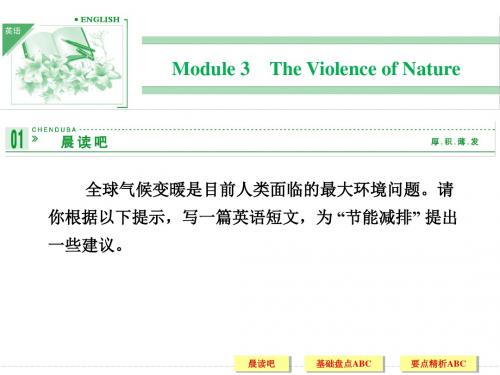
晨读吧
基础盘点ABC
要点精析ABC
【满分作文】 With the development of economy, more and more
greenhouse gases are being discharged into the air.①CO2 makes up about 70% of the greenhouse gases, which is considered to be one of the greatest causes of global warming.②It has harmful effects, causing the sea level to rise and many natural disasters to strike.
晨读吧
基础盘点ABC
要点精析ABC
【高级词汇】 discharge vt. 排放 make up 构成 natural disaster 自然灾害 【佳句变换】 ①CO2 making up around 70% of the greenhouse gases is
considered the first to account for global warming. ②Its harmful effects consist in the sea level to rise and
3.b_u__ry_ vt.埋葬
4.o_c_c_u_rvi.发生
5.s_t_r_ik_e_ vt.& n.(雷电、暴风雨等)袭击
6.r_u_i_nvt.毁坏
7._p_r_e_v_io_u_sadj.以前的
8.d_a_m__a_g_en.& v.损失;损害
9.e_x_p_e_r_i_en__ce_ vt. 经历→e_x_p_e_r_i_e_n_c_ed_ adj.有经验的
高一英语《Module 3 The Violence of Nature》语法

I. Learning Objectives:To learn about the past perfect passive and indirect speechII. Learning Method:To learn by using English in practice.III. Learning Procedures:Step 1 Learning about the past perfect passiveActive PassiveThey had given us visas for three months. We had been given visas for three months.Task 1. 概念: 。
Task 2. 基本结构:1)主动形式——— 2) 被动形式——●eg: It had stopped rained when I woke up.➢ (否定)➢ (一般疑问)⏹eg: By the end of last term , we had planted 2000 trees.➢ . (否定)➢ (一般疑问)➢ ? (回答)⏹eg: He told me that he had written a new book.➢ . (否定)➢ ? (一般疑问)➢ ? (特殊疑问)⏹eg: Peter had collected more than 300 Chinese stamps by the time he was born.. (否定)➢ ? (一般疑问)➢ ? (特殊疑问)Task 3. 时间状语:3.时态的用法:1)2)常用句型:1)主语 + had done + before/ when/ by the time +一般过去时When we arrived at the theatre, the play had already started.2)主语 +一般过去时 + after/ until/al though + had doneI enjoyed the play very much, although I had seen it once before.3)主语 + had done + by/ by the end of / by the time + 从句/ up to /till ( 表示过去时间)By the end of last year, the hunters had killed 12 tigers.4)No sooner had +主语+ done than +主语 +一般过去时Hardly had +主语done + when +主语+一般过去时Scarcely had +主语+ done when( before ) +主语+一般过去时Hardly had we gathered in the grain when it began to rain.5)It is + 段时间 since + did ( 结束性动词 )It was +段时间 since + had doneIt is five years since I left middle school.It was five years since I had left middle school.6)It is the first time ( that ) + have/has doneIt was the first time (that ) + had doneIt is my first time I have come to Hong Kong.It was my first time I had come to Hong Kong.7)用在间接引语中,以表示直接引语中的现在完成时态。
Module3 TheViolenceofNature

Module3 TheViolenceofNatureⅠ.单词语境记忆1.bury the old world and build a new one埋葬旧世界建设新世界2.the problem which should not occur 不该发生的问题3.the houses ruined by the flood 被洪水毁坏了的房子4.a natural disaster 自然灾害5.his previous decision 他以前的决定6.the village submerged by the flood 被洪水淹没的村庄7.a golden feather 金色的羽毛8.tropical forest 热带雨林9.cause huge waves 造成巨大的海浪10.the climate worldwide 世界各地的气候Ⅱ.词性转换与派生记忆1.cause vt.引起;导致→n.原因;事业2.strike vt.袭击→n.袭击;罢工3.damage v.损失;损害→n.损害;赔偿金4.experience vt.经历 n.经验;经历→experienced adj.有经验的5.furniture n.家具→furnish vt.装备;配备6.violent adj.猛烈的;激烈的;强烈的→violence n.暴力7.possibility n.可能;可能性→possible adj.可能的→impossible adj.不可能的8.terrifying adj.吓人的;可怕的→terrified adj.感到害怕的→terrify vt.使害怕9.luckily adv.幸运地;幸亏→lucky adj.幸运的→luck n.运气10.thankfully adv.感激地;满怀感谢地→thankful adj.感激的11.warning n.警告→warn v.警告12.erupt (火山的)爆发;喷发→eruption n.(火山的)喷发13.hopefully adv.满怀希望地;有希望地→hopeful adj.满怀希望的;有希望的→hope vt.& n.希望14.sadly adv.伤心地;不幸地→sad adj.悲伤的→sadness n.悲伤15.active adj.积极的;活跃的→act v.行动;举止→action n.行为→activity n.活动→actor n.男演员→actress n.女演员『联想记忆』1.“毁坏”动词家族①damage毁坏②destroy毁坏③ruin毁坏④harm损害⑤injure损害⑥hurt损害2.后缀-ly副词小结①thankfully感激地②truly真正地③bravely勇敢地④quietly安静地⑤similarly相似地⑥fluently流利地3.含后缀-ing名词集锦①warning警告,警示②feeling感情;感觉③meeting会议;集会④meaning意思;含义⑤spelling拼写;拼读4.“气象灾害”名词集合①thunderstorm雷暴②tornado龙卷风③hurricane飓风④snowstorm暴风雪⑤storm暴风雨5.“地质灾害”名词汇总①earthquake地震②flood洪水③drought干旱④tsunami海啸⑤landslide滑坡『短语背诵』1.on average 平均起来2.end up 以……结束;结果为……3.put out 扑灭(火)4.put down 记下;放下;镇压5.take off 脱掉;去掉;起飞;突然成功6.refer to 涉及;提到;参考,查阅;指的是7.turn over 翻过来;翻阅(书页)8.in all 总共;总计『词块积累』1.on the same latitude 在同一纬度2.catch fire 着火3.take place 发生4.from side to side 从一边到另一边5.lose one’s life 丧命6.set fire to/set...on fire 放火(焚烧)……1.They can destroy houses,but leave the furniture inside exactly where it was.它们(龙卷风)能够毁掉房子,却把房内的家具留在原处。
新课标外研社版高中英语必修三单元语言点讲解(Module3_The_Violence_of_Nature)

Moduel 3 The Violence of Nature 语言点1.disaster n. 灾害,灾难,不幸a natural disasterWe were all shocked by the disaster. 这场灾难使我们所有人大为震惊。
A disaster movieOur plan ended in disaster. 我们的计划以彻底失败告终。
disastrous adj 灾难性的;损失惨重的a disastrous mistake 招致大祸的错误disastrous results2. flood n.1. 洪水,大水;水灾2.. [the Flood(或Noah's Flood)]灭世洪水(挪亚时期遭受的大洪水)vt.1. 淹没;(雨水)使泛滥;使涨满水;从…中溢出:The river has flooded the meadows.河水淹没了草地。
The river is flooded by the rains.雨水使河水泛滥。
2. (洪水般)淹没;涌至,涌进:roads flooded with cars挤满了汽车的道路3. 充满,充斥;压倒;涌满:Music flooded the room.音乐充满了整个房间。
vi.1. 为水所淹;溢出;(潮水)上涨;泛滥:During spring rains the river floods.在春天的雨季,这条河河水泛滥。
2. (洪水般)流;涌进;充斥:When I drew the curtains back the sunlight flooded in.我拉开窗帘,阳光泻进房间。
Applications flooded in.申请书大量涌来。
3.experience n.1. (个人的)经验;体验2. 阅历(共同的)经历(或遭遇)vt. 1. 有…的经验;感受;遭受;经受,经历;体验:to experience nausea感到晕船to experience pleasure感到愉快2. 发现,通过亲身经历认识到,体验到:I have experienced that the sunrise can be so beautiful.我发现日出真美。
Module3TheViolenceofNature语言点(知识梳理)

Module3TheViolenceofNature语言点(知识梳理)学习目标重点单词occur, strike, experience, cause, ruin, bury, affect, warn重点短语end up, take off, pick up重点句型现在分词短语作结果状语There is /was the possibility of/that...leave+sth.+宾补过去分词做后置定语知识讲解重点单词occur【原句回放】Almost all of them occur in the US, in the area from Texas in the southeast to South Dakota in the north. 几乎所有的龙卷风都发生在美国,从东南部的德克萨斯州到北部的南达科他州。
【点拨】occur vi. 发生,显现;(某方法)显现在脑中,被想到。
occur to(方法念头等)想起,出现,常用于sth. occurs to sb.和it occurs to sb. t hat ... 结构。
That’s the place where the accident occurred.那确实是肇事地点。
A good idea occurred to me when I came into the classroom.我进到教室里的时候,突然想起了一个好主意。
It occurred to me that my mother’s birthday was coming.我突然想母亲的生日快到了。
某人突然想起:Sth. strike sb. that.../ It hit/strikes sb. that...A good idea occurred to/struck me all at once.突然间我想到了一个好主意。
【拓展】happen, occur, take place, break out辨析:happen表示“发生”时,强调事件发生的偶然性和不可预见性,其主语为事物;表示“碰巧”时,常用于it happened+that从句或happen to do sth句型中occur表示“发生”时,属于比较正式的用语,常以具体的事件、事物为主语,现在能够与happen互换。
- 1、下载文档前请自行甄别文档内容的完整性,平台不提供额外的编辑、内容补充、找答案等附加服务。
- 2、"仅部分预览"的文档,不可在线预览部分如存在完整性等问题,可反馈申请退款(可完整预览的文档不适用该条件!)。
- 3、如文档侵犯您的权益,请联系客服反馈,我们会尽快为您处理(人工客服工作时间:9:00-18:30)。
Module 3 The Violence of Nature 语言点学习目标重点单词occur, strike, experience, cause, ruin, bury, affect, warn 重点短语end up, take off, pick up 重点句型现在分词短语作结果状语There is /was the possibility of/that... leave + sth. + 宾补过去分词做后置定语知识讲解重点单词occur【原句回放】Almost all of them occur in the US, in the area from Texas in the southeast to South Dakota in the north. 几乎所有的龙卷风都发生在美国,从东南部的德克萨斯州到北部的南达科他州。
【点拨】occur vi. 发生,出现;(某想法)出现在脑中,被想到。
occur to(想法念头等)想起,浮现,常用于sth. occurs to sb.和it occurs to sb. that ...结构。
That 's the placwehere the accident occurred.那就是肇事地点。
A good idea occurred to me when I came into the classroom. 我进到教室里的时候,突然想起了一个好主意。
It occurred to me that my mother 's birthday was coming.我忽然想母亲的生日快到了。
某人突然想起:Sth. strike sb. that.../ It hit/strikes sb. that...A good idea occurred to/struck me all at once. 突然间我想到了一个好主意。
【拓展】happe n, occur, take place, break out 辨析:happen 表示“发生”时,强调事件发生的偶然性和不可预见性,其主语为事物;表示“碰巧”时,常用于it happened + that-从句或happen to do sth句型中occur 表示“发生”时,属于比较正式的用语,常以具体的事件、事物为主语,此时可以与happen 互换。
表示在脑海中出现某种想法"时,要用occur,而不可用happentake place多指有计划、有目的、有步骤地发生,比如举办活动、发生变化等break out 多指自然灾害、战争、某种疾病的突然爆发strike【原句回放】By the late 1890s, he had moved to Galveston, where he died in 1899, a year before the hurricane struck. 到19 世纪90 年代后期,他移居加尔韦斯顿,并于1899 年,即飓风发生的前一年,在那儿去世。
【点拨】strike v. (疾病、灾难)侵袭,爆发;擦(火柴);打,击;给人深刻印象;(时钟)敲响;罢工;突然想起n. 罢工;打击,攻击A big earthquake struck that area in August this year. 今年八月一次大地震袭击了那个地方。
He struck a match and lit the candle. 他划了一根火柴点燃了蜡烛。
Strike when the iron is hot. 趁热打铁。
The clock has just struck five. 钟刚敲过五点。
We are all struck by the beautiful scenery here. 这儿的美景令我们印象深刻。
They are striking for better working conditions. 他们为获得更好的工作条件而罢工。
It suddenly struck me how we could do it better. 我突然明白了我们怎样做得更好。
The workers are still on strike. 工人们还在罢工。
They made an air strike on the enemy ' s base. 他们对敌人基地进行了空袭。
experience【原句回放】Do you know anyone who has experienced one of the events? 你认识经历过以上事件中的一个事件的人吗?【点拨】experienee n.经验;经历;v.经历;遭受;experienee作经验"讲是不可数名词,作“经历”讲是可数名词。
from/by experienee 凭经验;从经验中(得出)Mr. Brown has a lot of experienee in teaehing. 布朗先生有丰富的教学经验。
Yesterday afternoon I had a terrible experienee. 昨天下午,我遭遇了一次可怕的经历。
Everyone experienees these problems at some time in their lives. 每个人在人生的某个阶段都会经历这些问题。
【拓展】experieneed adj. 有经验的;熟练的be experieneed in 在... 方面有经验He is experieneed in money matters. 他是处理金融事务的老手。
cause【原句回放】Do you know anything about the events? For example, what eauses them? 你知道关于这些事件的任何事情吗?例如,是什么引起了这些事件?【点拨】eause n. 原因,起因;事业;v. 引起,导致for a good eause 为了正义的事业Unemployment is a major eause of poverty. 失业是贫困的主要原因。
eause sb. to do sth. 促使某人做某事Vitamin defieieney in the diet ean eause illness. 饮食中缺乏维生素可能导致疾病。
What eaused him to ehange his mind? 是什么使他改变主意?cause and effect 因果关系There ' s no necessary cause and effect between incomaned happiness. 收入和幸福之间不存在必然的因果关系。
【拓展】cause和reason辨析cause指导致某事发生的原因或起因”,常跟of搭配。
reason指做某事的理由”,常跟for或why 引导的定语从句搭配。
We do not yet know the cause of the accident.我们尚不清楚事故的原因。
He has given no reasons for his decision.他并未说明他决定的理由。
Tell me the reason why you were so late this morning. 告诉我今天上午你来这么晚的原因。
ruin【原句回放】She returned home and found all the furniture had been ruined by the flood. 她回到家后发现她所有的家具都被洪水毁了。
【点拨】ruin v. (使)破产;(使)堕落;毁灭;n. 毁灭;废墟in ruins 成为废墟go/fall/come to ruin 毁灭;崩溃;破坏掉She wasn 't gointog let her plans go to ruin.她不会让她的计划破产的。
He stood very still, staring in at the ruins of his work. 他站在那里一动也不动,呆呆地看着他残余的作品。
He plotted the ruin of his enemy. 他阴谋倾覆他的敌人。
【拓展】ruin, damage, destroy 和harm 辨析ruin 一般指对物体或生命彻底的破坏,但往往是非暴力的,也往往不是一次性打击的结果,常指对美好的或希望中的事物的破坏。
damage 一般指对物体或生命的局部损伤,使整体的价值或作用降低或变得无价值、无作用。
既可作名词,也可作动词。
作名词时常构成搭配cause/do damage (to...)(对)造成损害。
destroy 往往指对某物体进行完全的毁坏,使之无法恢复。
harm 一般指伤害有生命的东西,常指伤及人的健康、权利、事业等。
The whole city was destroyed in the earthquake.整个城市在地震中被毁掉了。
We wanted to have a look at the ruins of Pompeii.我们想看一下庞贝城的废墟。
They managed to repair the houses that had been damaged. 他们设法修复了受到破坏的房子。
bury【原句回放】The cemetery where Coghlan was buried was destroyed by the hurricane and Coghlan ' s coffin ended up in the sea掩埋科格伦的公墓被飓风所摧毁,他的棺材最后被卷入了大海。
【点拨】bury v. 埋葬;掩埋;隐藏The UK, for example, is running out of areas for burying this unnecessary waste. 比如说英国,就在逐渐用光掩埋这些不必要垃圾的场所。
bury one ' s head/face in han用手捂住头/脸bury on eself in = be buried in 埋头于....She was sitting with her head buried in a newspaper.她坐着埋头看报纸。
The true facts are buried in a secret government report. 事实真相被掩藏于政府的一个秘密报告中。
affect【原句回放】…they usually affect the east coast of the US from Texas to Maine. 它们通常•影响从德克萨斯到缅因洲的美国东海岸地区。
